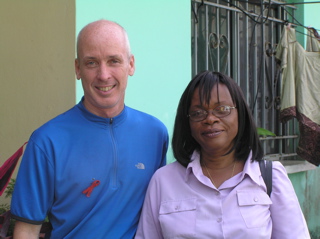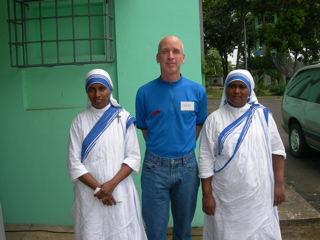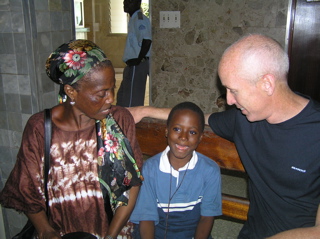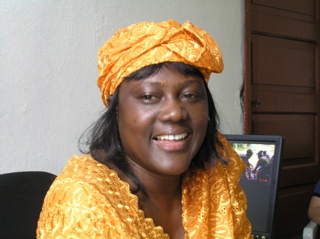Thank You, Liberia:
Ecumenical Gratitude for Works of Service
For Sunday August 6, 2006
Lectionary Readings (Revised Common Lectionary, Year B) )
2 Samuel 11:26–12:13a or Exodus 16:2–4, 9–15
Psalm 51:1–12 or Psalm 78:23–29
Ephesians 4:1–16
John 6:24–35
 |
Dr. Lily Sanvee. |
Last month I traveled to Monrovia, Liberia, to attend an HIV-AIDS workshop for health care workers conducted by Global Strategies for HIV Prevention. Liberia is a failed state that the Economist magazine identified as the single worst place in the world to live in 2003. Life expectancy at birth is 39 years, literacy for women is 40%, and unemployment is 80%. Since 1980 civil wars have slaughtered over 200,000 citizens and displaced another one million out of a population of 3 million, first under the despot Samuel Doe, then under the psychopath Charles Taylor and competing warlords, rebel factions, and drug-crazed gangs of children wielding AK-47s. People in the city fled to the country, passing columns of people in the country fleeing to the city, everyone carrying their mattress on their head. The psychology of fear due to indiscriminate killings dictated that any place seemed safer than where you were. Even today the United Nations maintains about 18,000 peacekeepers in Liberia. Monrovia has no water, no electricity (except for private generators and wells), and no garbage collection; around town piles of garbage and sewage rot under the relentless summer sun. In January 2006 Ellen Johnson-Sirleaf was inaugurated as the first freely elected woman head of state in the history of Africa, bringing at least a glimmer of hope to a ravaged nation.
If that's all you knew about Liberia, though, you'd have a very distorted picture of the country. Thank God for the Christians in Liberia who, according to our host, provide about 75% of the country's health care and education. Just to think of the new friends that I made there makes me feel small, and fills me with awe and gratitude. With remarkable joy, patience, perseverance and resourcefulness, they embody the words of the Apostle Paul in the reading from Ephesians this week. As each part of Monrovia's diverse Christian community performs works of love for the common good, I honestly believe that they "hold together" (v. 16) their entire country.
 |
Sisters of Charity attend the workshop. |
Dr. Lily Sanvee of St. Joseph's Catholic Hospital (Brothers of Saint John) hosted our four-day workshop on HIV prevention and treatment. Lily is the only woman surgeon in her country of three million people. In addition to hosting us, performing surgeries, serving as Medical Director of the entire hospital, answering her two cell phones, stopping in the hallways to respond to patients, fixing the generator so we could run the fans, replacing a blown fuse, chauffeuring our team to and from the airport, answering our endless stream of questions, escorting us to do souvenir shopping, and hauling dishes out of her tiny apartment every day to serve tea at 10am and then lunch at 2pm for fifty people—amidst this flurry of activity Lily exuded a spirit of quiet confidence, patience, and kindness.
Dr. Sanvee also organized our off-site visits to learn about other HIV programs in and around Monrovia.
Our visits included three Catholic programs. In Monrovia's densely populated slum called West Point, we visited Star of the Sea health clinic. They have electricity only three days a week for four hours a day, but they still offer competent and caring basic health care for those who otherwise would have nothing. At the Mother Patern College of Health Sciences Sister Barbara (she wore a bullet proof kevlar vest during the war) and Sister Tharaleela (from Sri Lanka) showed us their Volunteer Counselor and Testing course, medical technicians in white lab coats, library, offices with computers, job training school, and food distribution program. But among the Catholic saints I have to say that my favorite stop was the Sisters of Charity's hospice for the destitute, sick and dying (they have similar hospices in over 100 countries). The words painted on their gate tell the real story, thanks to people there like Sister Felixina: "Hope and Love." Thank God for the Catholics.
 |
Waiting for the doctor at St. Joseph's Hospital. |
We piled into our van and our driver Ousu Jalloh took us to the Lutheran headquarters, thanks in part to one of their counselors named Jusu Gowaa who attended our workshop. Their program manager Wonnoh Kie-Deranomie spoke at length about their comprehensive HIV-AIDS outreach, including centers where people can get a free HIV test, and a one year course for certification in Volunteer Counseling and Testing. Wonnoh also taught me a new acronym. She volunteered that she had a special interest in mother to child prevention of HIV. "Do you want to know why?" she asked. "You see, I am a PLW-HIV, a person living with HIV." Thank God for Jusu, Wonnoh, and all of Liberia's Lutherans.
Another workshop participant, Edward Borloh, introduced us to the Association of Evangelicals of Liberia, a federation of 300 local churches across the country. Their soft-spoken program officer for relief and development, D. Emmanuel Williams, was a Christian of unvarnished candor, compassion, and realism. We crowded into his tiny office, and as he spoke the surf of the Atlantic Ocean pounded away just outside the window with bars but no glass: "When it comes to HIV-AIDS, we still battle the problems of stigma, silence, ignorance, and apathy. People are reluctant to get tested. We've experimented with outreach efforts like seminars and conferences; some have succeeded and others have failed. Almost none of our pastors are paid adequately, so they must work second jobs to feed their families. They are thus busy and overworked, so we have found that it works best when a group of individuals in the church takes up the cause of HIV-AIDS. Plus, we're always grateful to co-operate and coordinate with Christians from across the denominational spectrum." Thank God for Liberia's evangelicals.
These Christian health care workers battle enormous odds. Electricity is sporadic. Medications are expensive. Ignorance is widespread, like the belief that the colostrum in a mother's breast milk is poisonous rather than nutritious. Superstitions persist, like drinking your own urine to cure HIV. After faith-based groups train their staff, NGO's will lure the best of them away with salaries 4-5 times what they make. The Global Fund can marginalize faith-based ministries, then turn around and ask for their data or expertise. Sister Barbara surprised us when she said that her biggest challenge combating HIV-AIDS is "food and housing." A brand new Partec CD4 counter from Germany designed to monitor an immunodeficient patient's viral load sits idle because $80,000 worth of reagents spoiled from lack of refrigeration. Anti-retrovirals are free, but no one knows whether the Global Fund will supply the next round. The government promises to prioritize electricity to hospitals and schools, but meanwhile St. Joseph's pays $1,000 a day to run its generator 18 hours a day.
 |
Lela Samuels founded an AIDS orphans program. |
This was my sixth trip to Africa, and I have to admit that corrupt dictators, crumbling economies, decade-long wars, famines, and disease make it easy to succumb to the pessimism exemplified in books like Martin Meredith's The Fate of Africa; From the Hopes of Freedom to the Heart of Despair (2005). But when I got home I saw a new book by the NPR correspondent Charlayne Hunter-Gault called New News Out of Africa: Uncovering Africa's Renaissance (Oxford, 2006). It occured to me that there is a renaissance of sorts in Liberia. You see it in huge roadside billboards around town that encourage people to get tested for HIV, to report a rape, and discourage domestic violence. You see it when the best of the best say no to an NGO salary, resist brain drain, and stay at Star of the Sea, and when the Truth and Reconciliation Committee convened the week we were there. There is a renaissance of courage, perseverance, and sacrificial service among Christians like the ones I met—Catholic, Lutheran, Protestant, and otherwise. "As each part does its work," their many "works of service" hold the entire country together like "supporting ligaments" (Ephesians 4:12,16) Thank you, Liberia!
For further reflection:
* What can believers in the rich west learn from Christians in a place like Liberia?
* What has been your experience of HIV-AIDS?
* What are the similarities and differences of the AIDS epidemic in Africa and in the west?
* On Liberia see Jon Lee Anderson, "After the Warlords," The New Yorker, March 27, 2006.
* See http://www.globalstrategies.org/.





